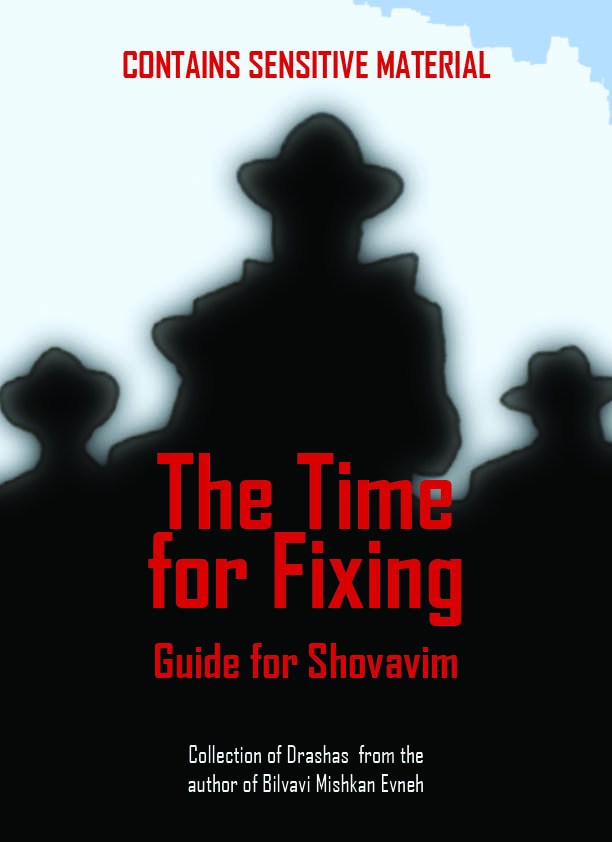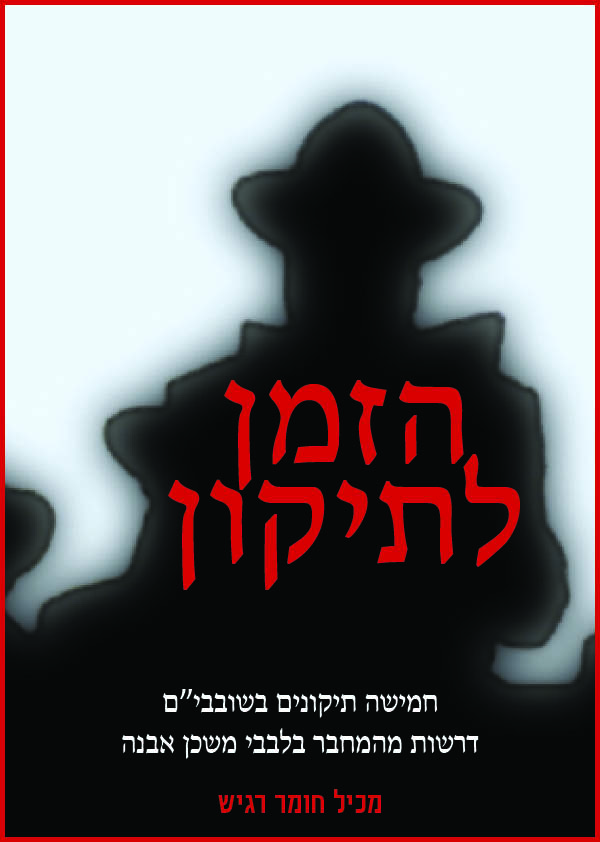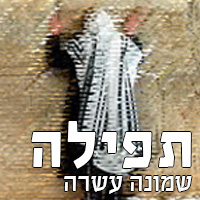- להאזנה דע את מידותיך הדרכה מעשית עפר עצבות מפורט 003 רוח שבעפר רוח נכאה
003 The Groan of Disappointment
- להאזנה דע את מידותיך הדרכה מעשית עפר עצבות מפורט 003 רוח שבעפר רוח נכאה
Fixing Your Earth [Sadness] - 003 The Groan of Disappointment
- 4423 reads
- Printer-friendly version
- שלח דף במייל
Wind-of-Earth-of-Earth: The Groan of Disappointment
With siyata d’shmaya we continue the discussion on the element of earth and the trait of sadness. In this lesson we will learn about sadness that stems from wind-of-earth [of earth].
Earth is the root of sadness, and wind is its opposite. Wind and earth are opposites of each other. Wind is movement, the opposite of earth, which doesn’t move. How can sadness result from earth and wind?
The Sages describe this kind of sadness as “anachah, a groan, which breaks half a person’s body” (according to another opinion in the Gemara, a groan breaks the entire person’s body).[1] What is anachah, a groan?
Earth is the root of the holy kind of laziness, also known as menuchah (serenity), which is the “secret of Shabbos Kodesh”, and hence the opposite of evil laziness. When the element of earth is impaired, the results are laziness and sadness. When the element of earth is repaired, it reveals menuchah\serenity. When wind crashes against the earth, there is a shrieking sound of the wind which sounds like a groan.
The word anachah is also related to the word hanachah, “placed down”. When wind travels, it has no rest. Movement is restless, and it will only ‘rest’ in order to move more. This is called hanachah, being placed down. When something is placed down, it is not there permanently, and it is only lying there because it will be picked up later. After the six days of the week, where there is movement\activity again, there is the menuchah of Shabbos, when the movements\activity of the weekday cease. On Shabbos, there is a hanachah, a cessation, of all movements. Then the six days of the week return. So even when one rests from movement on Shabbos, it is only for the purpose of moving again afterwards.
In the period of the Three Weeks, we have days of mourning, and when the Nine Days are over, we recite Nachamu Nachamu Ami, “Be consoled, be consoled, my nation” - there is nechamah, consolation. On a deeper note, this is also a movement which leads to serenity.
When wind\movement stops at a halt, it is being stopped by earth\serenity, and then the previous movements now become a cause for sadness. For example, we see that when one begins to move in order to do something, and he doesn’t get to complete it, he groans, out of disappointment. This is because his movement did not bring him to the desired serenity that he was seeking. The Gemara says that Dovid was groaning, and it was because his efforts didn’t entirely come to fruition.[2] When there is a stop to movement and the desired results don’t happen, a person becomes lazy, and sad. There is movement, the cessation of movement, the lack of serenity, a resulting laziness, which leads to a sadness. That is “anachah” - groaning.
On Tisha B’Av, the people “cried tears of vain”, due to the Spies’ report. What happened? They had left Egypt, and they were moving towards Eretz Yisrael, and now their movement stopped, because they didn’t come to their desired results. They did not get the serenity they wanted, and therefore they were very saddened. They wanted to get to their menuchah, their inherited land, where they would be able to build the Beis HaMikdash. Shlomo HaMelech was called ish menuchah (man of serenity) and he was the one who built the Beis HaMikdash, but the generation of the desert did not merit to reach the land and build the Beis HaMikdash, hence they never reached their menuchah. This led to their anachah, their sighs and their groans of sadness.
A groan of sadness not only breaks the heart, it breaks the body (either halfway, or totally), as the Gemara says. The groans broke the bodies of the Jewish people, and this was the true meaning behind the decree on the generation to die in the desert. This groaning was the root of the destruction of the Beis HaMikdash, which is the root of all sadness. It is written, “For great are my groans, and my heart is sick.”[3] Groaning out of sadness is the very symbol of the Destruction. As it has been explained here, whenever a movement has been stopped in its tracks - either totally or partially - this leads to groans of disappointment. Thus, to mourn over Yerushalayim is defined as groaning about the destruction.
This is the sadness that stems from wind-of-earth [of earth]. It is really a sadness brought about by a form of laziness, for it is caused by a halt of movement.
The Groan of Sadness vs. The Groan of Vitality
As mentioned in the previous lesson, the Baal HaTanya and others explained that the difference between atzvus\sadness and merirus\bitterness is, that sadness is a crushing state which leads to despair and a deathlike existence, whereas merirus\bitterness leads to vitality, energy and more life. Whenever a person groans out of disappointment, this can either be expressed as a physical groan of frustration, or, it can be used as an opportunity to gain vitality. We will explain how.
When groaning is coming from sadness, the breath (air\wind) of a person escapes from his throat, and he stays where he is, kind of paralyzed. This resembles death, when everything in the person goes still. Such a groan is an expression of the person’s sadness at being disappointed, that something has not come to fruition, and this is the kind of groan which the Gemara is referring to when it says that a groan breaks the entire person’s body. The kind of “groan that breaks a person’s entire body” is when a person groans out of sadness, frustration, disappointment, and it leaves a person in a deathlike state, where he is still and he doesn’t budge from his place.
However, in another scenario, a person will let out a groan of disappointment, but it doesn’t deplete his energy. He is ‘alive’ after the groan, as opposed to being ‘dead’ in the previously mentioned scenario. Such a groan is the kind of the ‘groan that breaks half his body’ – but it does not break the entire body.
Only when a person becomes deathlike after groaning, does the groan break the entire body. This is the depth behind the argument in the Gemara if a groan breaks half or the entire body. A groan causes the breath\air\wind of a person to escape outward. When one’s spirit has gone outward and it doesn’t return to him, this groan will cause a person to be sad, because it resembles a state of death. In contrast to this, a person’s breath\air\wind can leave a person and then return to him, in the form of focused inhaling and exhaling. In this scenario, the breath hasn’t merely gone outward from the person. It returns to the person, and it renews his spirit, filling him with renewed vigor and energy. If a person groans in this way, it actually makes him more alive.
A dead person doesn’t breathe in and out. He has no breath, no air, hence he has lost his wind. He is missing the ruach chaim, the spirit of life, which personifies a living person. The dead person’s air\wind has gone entirely outward, and it hasn’t returned to him. A groan, when it is emitted on an impaired level [without conscious awareness, as will soon be explained] is a debilitating act which is deathlike to a person. This is the depth behind the matter that being in a state of sadness causes the soul to depart from a person.
In contrast to this, a groan can also be emitted in a way that brings more life to a person. It is written, “It is good to go to a house of mourning, and the living will take to heart.”[4] When one goes to a house of mourning, where people sigh and groan, because they are in sadness as they mourn and grieve the deceased, this is a constructive kind of groan which provides a person with more vitality. Such a groan doesn’t just escape outward from a person, it re-enters him afterwards, renewing the person with a new sense of life. It is a holy kind of groaning.
The idea here is that when a person groans, he needs to make sure that he ‘breathes back in’ the air\ wind that has left him. Practically speaking, this means that after one groans, even if he is doing so because he is disappointed and frustrated about something, he should feel that the groan has renewed his soul.
This is the depth behind how going to a house of mourning brings more vitality to a person. A groan doesn’t have to sap the energy and life out of a person. To the contrary, it can give more vitality to a person. The air\wind emitted from such a groan resembles the holy wind that is “Ruach apeinu Mashiach Hashem”, “The breath of our nostrils, the messenger of Hashem”.[5] This is also the depth of the statement, “On the day of the destruction of the Beis HaMikdash, the Mashiach is born.”[6] The wind, the life-giving air that has left us – on a deeper level, our spiritual source of vitality - can be returned to us. And when it returns, it is a more renewed, spiritual kind of air that is a new source of energy for us. This is also the implication of “One who mourns Jerusalem, will merit to see it rebuilt.”[7]
In Summary
Thus, there are two kinds of groans. One kind of groan is destructive to the spirit and to the body, for it increases the element of earth in the soul, which in turn causes sadness. The other kind of groan is holy, and it gives renewed vitality to a person.
Going to Sleep with the Awareness that My Soul Will Return Upon Awaking In The Morning
Sleep is called “a sixtieth of death”.[8] When a person sleeps, his soul leaves him. In different terms, his “wind” leaves him as he sleeps. His “spirit of life” returns to its Source above as he sleeps, and his body lies still. When a person goes to sleep, he knows that he is giving over his soul to Hashem and he is confident that he will wake up the next morning, with his soul returned to him, and with a renewed spirit. There are a few people who, unfortunately, go to sleep wishing they won’t wake up the next day. But most people believe that they will wake up the following morning, and they want to. [However, this confidence is usually only in the subconscious, so it is often a lost opportunity for growth].
One should become becomes consciously aware, before going to sleep, that his spirit will be leaving him, and that it will be returned to him upon awaking. When one has this awareness, his sleep becomes an experience of renewal for him. He becomes consciously aware that the body goes silent as he sleeps, and that his wind\soul returns to its Source and becomes renewed, and then returns to the body in the morning, whereupon the body and soul are both renewed. In this way, sleep can be an opportunity to access a holy kind of groan, when a person is aware that his absence of spirit when he sleeps is actually a means to renew the spirit.
Transforming Our Groans Into a Source of Vitality-Giving Energy
When a person feels exhausted and depleted from physical energy, naturally, he groans. If one groans without any awareness, it leaves a person feeling kind of dead. The result will be that he becomes immobile and he simply stays where he is, feeling like he can’t do anything, and this resembles being dead. Instead, a person can use the groans of his disappointment as a way to become consciously aware that his spirit is leaving him and then returning to him renewed, and that this, itself, is renewing him. One can become aware that he is groaning, let his wind outward, and that his wind can return to him and renew him.
Without being consciously aware, a person simply lets out groans and sounds of frustration, whenever he meets disappointment. This kind of groaning does not renew him, and it will only increase his anxiety level. Instead, when a person meets disappointment, he can groan with the awareness that his groan is an escape of breath that can return to him and renew him. For indeed, the breath that returns to him is a completely new breath. The groan should be released with this conscious awareness that it is an act of renewal - as opposed to a simple reaction to the feeling of frustration and disappointment.
This is the holy use of the power that is called “asleep while awake”. This is a groan that emanates from amidst menuchah\serenity, not a groan that comes from laziness. This idea can be practiced throughout the day, whenever one feels disappointment or frustration at something, but one should mainly work on this idea at a serene time, when one has quieted his mind, as opposed to a stressful time.
In summary, the holy kind of groan is when there one has the awareness that he is about to let out a groan, and that he is aware that he is disappointed and that is why he is groaning, and in addition, he lets out the groan with the intention of being renewed after his next breath. One becomes aware that he is releasing his wind outward and that he will be breathing it back in, when it is renewed. He becomes aware that he is emptying out his breath\wind\spirit, and in turn, he is receiving a renewed wind\spirit. This is the holy way to use the power of “Great are my groans” – but although it is a groan, it does not lead to the end of the verse, “My heart is sick within me.”
A World of Inner Movement
One who lives mainly in his inner world, and less in the external, superficial world, is able to feel the inner movements of his soul. These movements are called ratzu v’shov, “advancing and retreating”. When one lives an inner kind of life, he lives inwardly, meaning that the main movements in his life are felt on an inward level, as opposed to his outer, external movements, which are deemed superficial.
A person who lives on the inside, in the inner world, is able to identify well with the concept described here, of becoming aware of the exit and re-entering of the breath. When one feels exhausted he can feel vitality from his breaths and become renewed, and then he continue on with his actions, from that renewed place.
But one who lives superficially will have difficulty understanding this concept. A person who lives mainly in the external world outside of him is living superficially, and he resembles a dead person, because has no life taking place inside of him. When he feels exhausted, he isn’t aware of how much energy he really has and how much he doesn’t, become he isn’t aware of his inner movements. Only when one lives inwardly can he discern his energy level, how much he can do and how much he can’t. He can have constant renewal in his life.
In Conclusion: A Resemblance of “Resurrection of the Dead” for the Soul
When one encounters frustration and disappointment and his groans are emitted with the kind of awareness that was described here, he transforms all of his groans into a source of vitality-giving energy, which infuses him with more and more life, as opposed to the groans which debilitate and break the person.
Making use of this power is called a degree of “Resurrection of the Dead”, for at the Resurrection of the Dead, the wind (life\spirit\soul) will re-connect with the earth (death\body) to renew it. Although is not the total level of the Resurrection of the Dead, it is still an illumination of it, and it can experienced on a soul level.
This all rectifies the sadness which stems from wind-of-earth [of earth] in the soul. It removes a person from the laziness that stems from wind-of-earth [of-earth], which in turn removes the sadness, and instead gives a person a ruach chaim, a renewed “spirit of life”.
NOTE: Final english versions are only found in the Rav's printed seforim »















